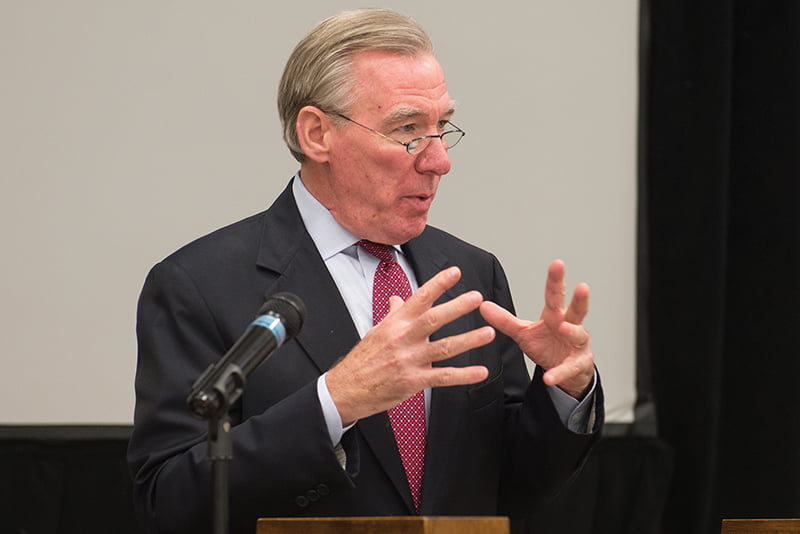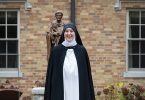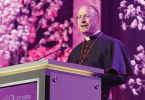
John H. Garvey, president of The Catholic University of America in Washington, D.C., speaks on “Go and Make Disciples: The Role of Catholic Schools” on Oct. 11. LEAVEN PHOTO BY JOE BOLLIG
by Joe Bollig
joe.bollig@theleaven.org
KANSAS CITY, Kan. — A taste of the richness of the Catholic intellectual tradition was part of the dinner program of an annual meeting of Catholic school board trustee members held Oct. 11 at Savior Pastoral Center here.
The evening began with a Mass celebrated by Archbishop Joseph F. Naumann and concelebrated by Father William Bruning and Father Andrew Strobl. Monsignor. Gary Applegate was master of ceremonies.
The evening’s speaker was John H. Garvey, president of The Catholic University of America in Washington, D.C.
In his presentation, “Go and Make Disciples: The Role of Catholic Schools,” Garvey talked about what makes a Catholic education special.
Not only is Garvey a product of Catholic education and in the business of Catholic education, but his five children have collectively acquired 96 years of Catholic education.
“I tell parents this when they bring their kids to look at Catholic University,” he said. “The principal reason I took the job was that I was broke from sending them to Catholic school and marrying them off!
“But I’d do it all over again, because it’s the most important thing we can do for our children.”
He recalled from the Gospel of Luke how Jesus grew up “advancing in wisdom and grace.” Advancing in wisdom and grace are related to one another in an intrinsic way — one being essential to the acquisition of the other.
“For Catholics — and not just for Catholics, I might add — is that wisdom and grace are intrinsically related, but grace comes first.”
Cardinal John Henry Newman, who wrote “The Idea of a University,” said it was a mistake for colleges to separate wisdom and grace. We can see the wisdom of the church establishing its universities so we could “reunite things which in the beginning were joined by God but put asunder by man,” said Garvey. Both religion and the intellect should have the utmost freedom, both in the same place and the same persons.
“This is why at The Catholic University of America we strive to make the sacraments readily available to our students,” said Garvey. “There are 10 Masses a day on campus, and confessions 365 days a year for six hours a day at the basilica, which we like to call our chapel.
“There are within walking distance of my office on campus 26 tabernacles.”
At a Catholic university, he said, the norms and practices and culture ought to make it easier for students to accept the invitation of the Gospel. That’s why he led a return to the older practice of separating resident halls by gender.
“The aim was simple. It was to encourage behavior in keeping with the church’s teaching on chastity,” said Garvey.
One controversy that has roiled Catholic education has to do with faculty hiring and St. John Paul II’s apostolic constitution on Catholic universities “Ex Corde Ecclesiae.”
The pope’s document says that Catholic universities must limit hiring of non-Catholic faculty in order to protect the Catholic identity of the institutions.
“There is always a latitudinarian faction that . . . [says] while it’s important to consider a candidate’s faith when we are hiring theologians, there’s no such thing, they say, as a Catholic mathematics, or law, or history,” said Garvey.
“In hiring for these disciplines they say we want to make sure the people we hire respect our Catholic identity,” he continued, “but we don’t need to concern ourselves with their beliefs.
“This is a mistake for two reasons. First, faith is not an intellectual game like Scrabble that we play on one board at set times and under certain defined rules. It permeates all of our lives, even history and even math.
“Second, education in the faith is not limited to acquiring the theological virtue of that name. We want the students at The Catholic University of America — as you want the students at your schools — to grow in all the virtues.
“And it’s the job of the teacher, no less than the campus minister, to help them do that.”
Garvey concluded his remarks by noting that Catholic kids who are sent to Catholic schools have better Mass attendance at The Catholic University of America than those who went to public schools.
“I tell this to parents all the time. If you want your kids to grow up and go to church, send them to Catholic schools,” he said. “Not my Catholic school, but your Catholic schools.
“That’s where they learn it and keep it or lose it, depending on what you do.”
Archdiocesan superintendent Kathleen O’Hara presented Garvey with a rosary as a token of appreciation. There was a brief business meeting, and then Archbishop Naumann ended the event with some closing remarks.






